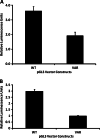Functional characterization of a genetic polymorphism in the promoter of the ESR2 gene
- PMID: 21979797
- PMCID: PMC3402208
- DOI: 10.1007/s12672-011-0086-2
Functional characterization of a genetic polymorphism in the promoter of the ESR2 gene
Abstract
The ESR2 gene encodes the estrogen receptor beta protein. Several studies have shown that genetic variants in the ESR2 gene are associated with a variety of clinical phenotypes. However, very little is known about the functional significance of ESR2 genetic variants. We used a bioinformatics approach to identify regions of the ESR2 promoter that is evolutionarily conserved across the genomes of several species. We resequenced 1.6 kb of the ESR2 gene which included 0.8 kb of the promoter, 0.3 kb of exon ON, and 0.5 kb of the following intron. We identified five single-nucleotide polymorphisms (SNPs) in the ESR2 promoter and one SNP in the intron. Phase analysis indicated that the SNPs likely exist in 11 different haplotypes. Three of the SNPs (rs8008187, rs3829768, rs35036378) were predicted to alter transcription factor binding sites in the ESR2 promoter. All three were detected only in African American subjects. The rs35036378 SNP was in the TATA box and was highly conserved across species. ESR2 promoter reporter assays in LNCaP and SKBR3 cell lines showed that the variant construct containing the rs35036378 SNP allele had approximately 50% less activity relative to the wild-type construct. We conclude that the rs35036378 SNP appears to cause a reduced promoter activity of the ESR2 gene.
Conflict of interest statement
We declare no conflict of interest.
Figures



Similar articles
-
The promoter region of the MDR1 gene is largely invariant, but different single nucleotide polymorphism haplotypes affect MDR1 promoter activity differently in different cell lines.Mol Pharmacol. 2006 Jul;70(1):267-76. doi: 10.1124/mol.105.019810. Epub 2006 Apr 11. Mol Pharmacol. 2006. PMID: 16608921
-
Single-nucleotide polymorphisms in the C-reactive protein (CRP) gene promoter that affect transcription factor binding, alter transcriptional activity, and associate with differences in baseline serum CRP level.J Mol Med (Berl). 2005 Jun;83(6):440-7. doi: 10.1007/s00109-005-0658-0. Epub 2005 Mar 19. J Mol Med (Berl). 2005. PMID: 15778807
-
Estrogen receptor beta (ESR2) polymorphisms in interaction with estrogen receptor alpha (ESR1) and insulin-like growth factor I (IGF1) variants influence the risk of fracture in postmenopausal women.J Bone Miner Res. 2006 Sep;21(9):1443-56. doi: 10.1359/jbmr.060605. J Bone Miner Res. 2006. PMID: 16939403
-
A systematic review of the relationship between polymorphic sites in the estrogen receptor-beta (ESR2) gene and breast cancer risk.Breast Cancer Res Treat. 2011 Feb;126(1):37-45. doi: 10.1007/s10549-010-0891-2. Breast Cancer Res Treat. 2011. PMID: 20390341
-
Association of polymorphisms in estrogen receptors (ESR1 and ESR2) with male infertility: a meta-analysis and systematic review.J Assist Reprod Genet. 2014 May;31(5):601-11. doi: 10.1007/s10815-014-0212-5. Epub 2014 Mar 20. J Assist Reprod Genet. 2014. PMID: 24647635 Free PMC article.
Cited by
-
How to Use SNP_TATA_Comparator to Find a Significant Change in Gene Expression Caused by the Regulatory SNP of This Gene's Promoter via a Change in Affinity of the TATA-Binding Protein for This Promoter.Biomed Res Int. 2015;2015:359835. doi: 10.1155/2015/359835. Epub 2015 Oct 4. Biomed Res Int. 2015. PMID: 26516624 Free PMC article.
-
Obesity-related known and candidate SNP markers can significantly change affinity of TATA-binding protein for human gene promoters.BMC Genomics. 2015;16 Suppl 13(Suppl 13):S5. doi: 10.1186/1471-2164-16-S13-S5. Epub 2015 Dec 16. BMC Genomics. 2015. PMID: 26694100 Free PMC article.
-
Candidate SNP markers of aggressiveness-related complications and comorbidities of genetic diseases are predicted by a significant change in the affinity of TATA-binding protein for human gene promoters.BMC Genomics. 2016 Dec 28;17(Suppl 14):995. doi: 10.1186/s12864-016-3353-3. BMC Genomics. 2016. PMID: 28105927 Free PMC article.
-
Candidate SNP Markers of Chronopathologies Are Predicted by a Significant Change in the Affinity of TATA-Binding Protein for Human Gene Promoters.Biomed Res Int. 2016;2016:8642703. doi: 10.1155/2016/8642703. Epub 2016 Aug 22. Biomed Res Int. 2016. PMID: 27635400 Free PMC article.
-
Chicken mannose-binding lectin (MBL) gene variants with influence on MBL serum concentrations.Immunogenetics. 2013 Jun;65(6):461-71. doi: 10.1007/s00251-013-0689-6. Epub 2013 Mar 2. Immunogenetics. 2013. PMID: 23455474
References
-
- Jin Y, Hayes DF, Li L, Robarge JD, Skaar TC, Philips S, Nguyen A, Schott A, Hayden J, Lemler S, Storniolo AM, Flockhart DA, Stearns V. Estrogen receptor genotypes influence hot flash prevalence and composite score before and after tamoxifen therapy. J Clin Oncol. 2008;26:5849–5854. doi: 10.1200/JCO.2008.16.8377. - DOI - PMC - PubMed
-
- Ntukidem NI, Nguyen AT, Stearns V, Rehman M, Schott A, Skaar T, Jin Y, Blanche P, Li L, Lemler S, Hayden J, Krauss RM, Desta Z, Flockhart DA, Hayes DF. Estrogen receptor genotypes, menopausal status, and the lipid effects of tamoxifen. Clin Pharmacol Ther. 2008;83:702–710. doi: 10.1038/sj.clpt.6100343. - DOI - PMC - PubMed
Publication types
MeSH terms
Substances
Grants and funding
- R01 GM088076/GM/NIGMS NIH HHS/United States
- M01-RR00750/RR/NCRR NIH HHS/United States
- R01 GM099143/GM/NIGMS NIH HHS/United States
- U01GM061373/GM/NIGMS NIH HHS/United States
- M01 RR000750/RR/NCRR NIH HHS/United States
- 5U01GM061373/GM/NIGMS NIH HHS/United States
- M01-RR020359/RR/NCRR NIH HHS/United States
- M01-RR000042/RR/NCRR NIH HHS/United States
- M01 RR020359/RR/NCRR NIH HHS/United States
- U01 GM061373/GM/NIGMS NIH HHS/United States
- M01 RR000042/RR/NCRR NIH HHS/United States
- 5K24RR020815/RR/NCRR NIH HHS/United States
- K24 RR020815/RR/NCRR NIH HHS/United States
LinkOut - more resources
Full Text Sources
Miscellaneous

